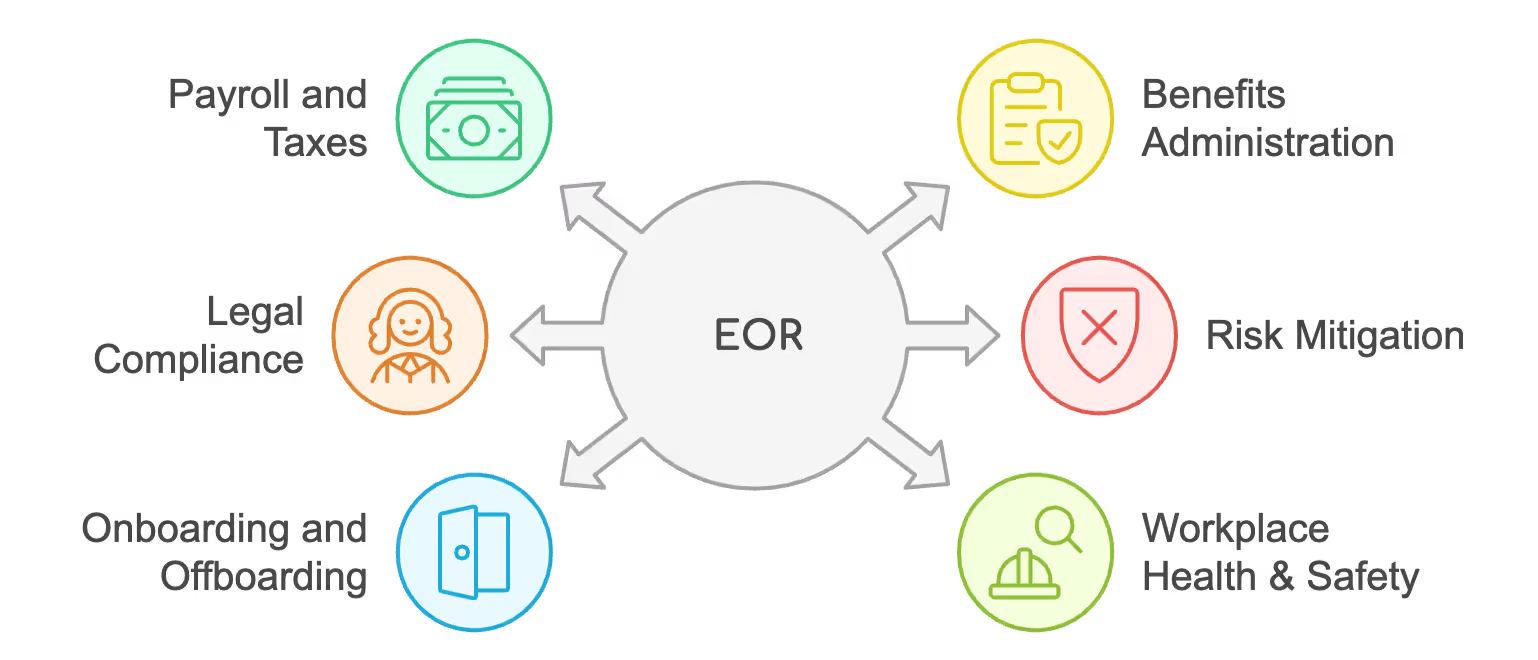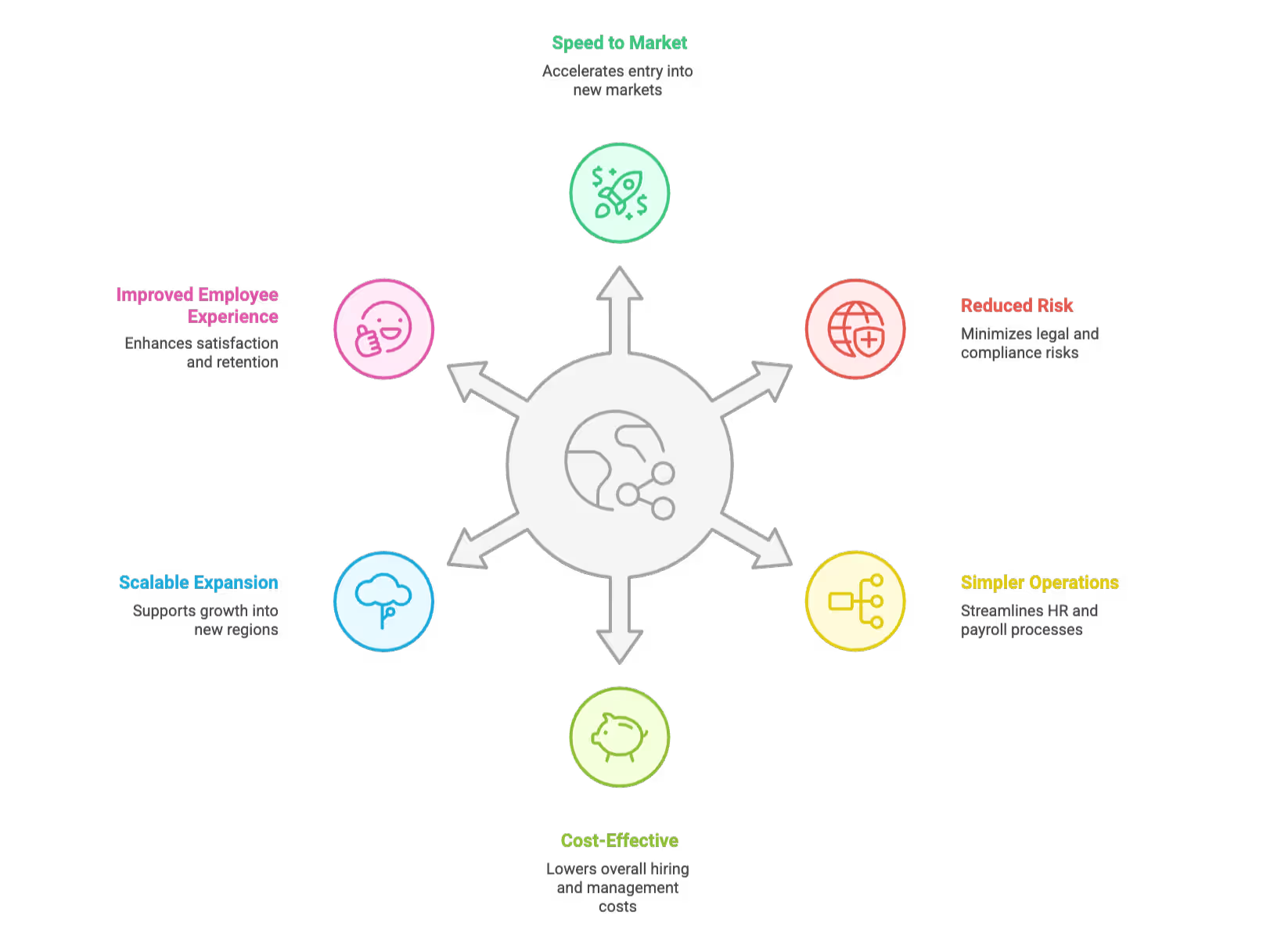Hiring people in another country sounds exciting, but it can also feel like you’re trying to solve a Rubik’s Cube blindfolded. Every country has its own maze of labour laws, tax rules, and paperwork that can make your head spin.
That’s where the idea of an Employer of Record (EOR) comes in. An EOR is a third-party organization that handles the legal and compliance aspects of hiring employees internationally. That will allow your business to expand into new markets without the burden of setting up a local entity.
The EOR model has gained explosive momentum as the nature of work transforms. In 2026, remote work reached 52% of the global workforce, nearly doubling from pre-pandemic levels. Meanwhile, the global EOR market is valued at $5.97 billion in 2026 and is projected to reach $10.46 billion by 2035, with a compound annual growth rate (CAGR) of 6.8%. This growth reflects how EOR services have evolved from a niche solution into a strategic enabler for companies accessing global talent without establishing foreign entities.
In this article, we'll explain exactly what an EOR is, how it works, why it's useful, and how much it costs. We'll also answer some common questions to help you decide if an EOR is right for your business.
What Is an Employer of Record?
An Employer of Record (EOR) is a third-party organization that legally employs workers on behalf of another company. The EOR handles all employment paperwork, tax filings, and legal compliance while the client company directs the employee's daily work. According to recent research, 87% of companies planning expansion say that meeting local tax and employment regulations will be their hardest task in 2026.
In this arrangement, the EOR becomes the official employer on paper. This means the EOR's name appears on employment contracts, tax documents, and payroll records. The client company still manages what the employee does each day.
Here’s how it works:
- The EOR is responsible for legal things, like contracts and taxes.
- The client company tells the employee what work to do, like any other boss.
- The employee works for the client company but is officially employed by the EOR.
Think of it as sharing responsibilities: the EOR handles the legal side of employment, while the client company handles the work side. This setup allows companies to hire workers in countries where they don't have a legal business entity.
This model is especially helpful for companies expanding globally for the first time. It removes the need to set up a local company in each new country where they want to hire talent. Understanding what is an EOR is crucial for businesses that want to scale internationally without the overhead of legal entity setup.
What Does an EOR Do?

An Employer of Record handles specific employment tasks that would otherwise require local expertise or a legal entity in the employee's country. The EOR takes care of the paperwork while the client company focuses on the actual work.
Here’s what an EOR does:
Payroll and Taxes
The EOR manages the entire payroll process for international employees. This includes:
- Calculating wages: Processing regular pay according to local requirements
- Tax withholding: Deducting the correct amount of income tax based on local laws
- Filing reports: Submitting all required tax documents to government authorities
- Currency conversion: Ensuring employees are paid in their local currency
For example, an EOR hiring in Canada would handle Canada Pension Plan contributions and provincial tax variations, while an EOR hiring in the United States would manage Social Security and Medicare withholdings.
Benefits Administration
EORs also manage employee benefits according to local requirements and customs:
- Mandatory benefits: Providing legally required benefits like healthcare, paid leave, and retirement plans
- Optional benefits: Administering additional benefits the client company chooses to offer
- Local compliance: Ensuring benefits meet or exceed local standards
For example, in Canada, this might include calculating vacation pay and health insurance contributions. In the US, it could involve meeting state-specific benefit regulations.
Legal Compliance
EORs ensure that employment practices follow local laws:
- Contract creation: Drafting compliant employment agreements in the local language
- Work authorization: Supporting visa or work permit processes when needed
- Labour law compliance: Following local rules for working hours, termination, and other employment matters
This compliance function is particularly valuable when hiring in countries with complex labour laws or frequent regulatory changes.
Risk Mitigation
By serving as the legal employer, the EOR assumes much of the employment-related liability. This includes handling workers' compensation claims, managing disputes, and navigating termination procedures according to local regulations.
Onboarding and Offboarding
An essential part of an EOR involves managing the full employee lifecycle, which includes comprehensive onboarding and offboarding processes to ensure compliance and smooth transitions:
- Onboarding:
- Preparing and providing legally compliant employment contracts and documents
- Registering employees with relevant government agencies or social security systems as required
- Setting up payroll, benefits, and tax withholdings from the first day of employment
- Offboarding:
- Managing resignation, termination, or contract completion procedures according to local labor laws
- Ensuring timely final payroll settlement, including unused leave payout and severance if applicable
- Providing required documentation, such as experience certificates or termination letters
Workplace Health & Safety
EORs often ensure that the workplace, even if virtual, complies with local health and safety regulations:
- Safety compliance: Ensuring employees have a safe and compliant work environment based on local laws.
- Workplace policies: Drafting workplace safety policies and ensuring they adhere to local regulations (e.g., working conditions, fire safety standards).
For example, in the UK, an EOR would help businesses comply with workplace health and safety laws under the Health and Safety at Work Act.
Why Use an EOR for Global Hiring?

Companies use Employers of Record for several practical reasons, especially when hiring internationally for the first time.
Speed to Market
Setting up a legal entity in a new country typically takes 3-6 months and requires significant paperwork, legal fees, and ongoing maintenance. An EOR allows companies to hire in days or weeks instead.
This speed advantage helps companies:
- Respond to opportunities: Quickly hire talent when market conditions are favorable
- Test new markets: Explore potential in a country before committing to a permanent presence
- Onboard talent fast: Bring on key employees without lengthy delays
For example, a Canadian tech company could hire a software developer in Germany within two weeks using an EOR, compared to several months if establishing a German subsidiary.
Reduced Risk
EORs significantly lower the legal risks of international hiring:
- Compliance expertise: EORs stay current with changing employment laws
- Misclassification protection: Properly classifying workers as employees rather than contractors
- Liability management: The EOR assumes legal responsibility for employment compliance
This risk reduction is especially valuable in countries with strict labour laws or complex regulatory environments.
Simpler Operations
Using an EOR streamlines global employment:
- Centralized management: One platform to manage employees across multiple countries
- Consistent processes: Standardized onboarding, payroll, and benefits administration
- Reduced administrative burden: Less paperwork and fewer systems to manage
This operational simplicity allows companies to focus on growing their business rather than managing international compliance.
Cost-Effective
While there are upfront costs associated with an EOR, they can often be more cost-effective compared to setting up a local legal entity. Establishing a business entity in a new country typically involves:
- Legal fees: Hiring local legal experts to navigate the laws.
- Office setup: Rent, utilities, and other operational expenses.
- Employee benefits and overhead: These can quickly add up as you set up local operations.
An EOR can save you money by eliminating the need for expensive legal procedures and ongoing maintenance costs, especially for small or growing businesses.
Scalable Global Expansion
As your company grows, you may need to hire in more countries. EORs can help you scale rapidly by easily expanding into new markets. This flexibility makes it easier for businesses to:
- Adapt to new markets: Enter and exit markets more easily, without the administrative burden of establishing a local presence.
- Maintain compliance across borders: Ensure that each country’s hiring laws are followed without needing local HR teams.
Improved Employee Experience
EORs can help improve the employee experience by ensuring that employees are paid on time, receive proper benefits, and have legally compliant contracts. This leads to:
- Better employee retention: Employees are more likely to stay with a company that treats them well and ensures compliance with local laws.
- Global consistency: Ensures that employees in different countries have a similar experience in terms of payroll, benefits, and legal protections.
EOR vs Staffing Agency vs PEO
When hiring workers, companies have several service options. Each works differently and serves different purposes.
EOR vs Staffing Agency
Staffing agencies and EORs serve different purposes:
- Employment duration: Staffing agencies typically focus on temporary placements; EORs support long-term employment
- Services provided: Staffing agencies primarily recruit and place workers; EORs handle ongoing employment administration
- Legal relationship: With staffing agencies, the agency may or may not be the legal employer; with EORs, the EOR is always the legal employer
A staffing agency helps find talent, while an EOR helps employ talent you've already identified in countries where you don't have a legal entity.
EOR vs PEO
Professional Employer Organizations (PEOs) differ from EORs in several important ways:
- Co-employment: PEOs create a shared employment responsibility; EORs take full legal responsibility
- Geographic focus: PEOs typically operate within a single country; EORs specialize in international employment
- Entity requirements: PEOs require the client to have a local entity; EORs don't require a local entity
For example, a US company might use a PEO to outsource HR for its domestic employees while using an EOR to hire employees in other countries.
When to Use an EOR?
Several scenarios make an EOR the smart choice:
- If you're considering expansion into a new country but aren't sure it'll work out, an EOR lets you hire a few people and validate the market without the commitment of setting up a legal entity. You can always establish your own entity later if things go well.
- When you find the perfect candidate in another country, you don't want to lose them because of a six-month entity setup process. An EOR can have them onboarded in a matter of weeks.
- Sometimes the best person for the job lives somewhere you have no physical presence. An EOR makes it possible to hire that specialist without geographic constraints.
- If you need employees for a specific project or limited duration, the cost and effort of establishing an entity doesn't make sense. An EOR provides a flexible alternative.
- After acquiring a company in another country, you might not want to immediately merge entities. An EOR can manage those employees during the transition period.
- Maintaining a legal entity comes with ongoing costs, accounting, legal fees, corporate taxes, annual filings. For small teams in a given country, an EOR can be more cost-effective.
- Some countries have particularly challenging employment regulations. Using an EOR with local expertise reduces your risk of costly compliance mistakes.
How to Choose an Employer of Record Company?
Selecting the right EOR partner involves evaluating several key factors.
Coverage and Expertise
EORs vary in their global reach and local knowledge:
- Geographic coverage: Some EORs operate in a handful of countries, while others cover 100+ countries. Make sure the EOR covers the regions where you plan to hire.
- Local expertise: Different countries have different employment laws, so you need an EOR that is familiar with the specific laws and employment practices of the countries you're hiring in.
- Industry experience: Some EORs specialize in specific industries (e.g., tech, healthcare, or finance), so look for an EOR with experience in your industry or with employees who have specific role requirements.
Pricing Models
EOR pricing structures vary widely:
- Percentage model: Fees are calculated as a percentage of the employee's salary, typically ranging from 8-15%.
- Flat fee model: Some EORs charge a fixed monthly rate per employee, which can range from $400 to $1,000 CAD per month.
- Additional costs: Be aware of extra fees such as setup fees, termination fees, or charges for currency conversion.
To avoid surprises, always request a detailed breakdown of costs and understand exactly what is included in the pricing. Some EORs might charge extra for things like employee benefits, visa support, or termination services.
Technology and Support
The platform and support services offered by the EOR play a huge role in the day-to-day management of employees. Here’s what to consider:
- User interface: Look for a platform that is easy to use for both your team and employees. The interface should simplify onboarding, document management, and payroll processes.
- Support availability: Make sure that the EOR offers customer support when needed. Ideally, they should have support available during relevant time zones to accommodate your global teams.
- Integration capabilities: The EOR should be able to seamlessly integrate with your existing HR or payroll systems. This will help streamline operations and reduce manual data entry.
Modern EORs increasingly use technology to streamline employment processes. For example, Borderless AI uses artificial intelligence to automate contract generation and compliance checks.
How Much Does an EOR Cost
The cost of Employer of Record (EOR) services can vary, but generally, they fall within one of these two pricing models:
- Percentage model: EORs typically charge 8-15% of an employee’s salary.
- Flat fee model: Alternatively, EORs may charge a fixed monthly fee ranging from $400 to $1,000 per employee, depending on the country and services offered.
The exact amount depends on several factors:
- Location: Costs vary by country due to different compliance requirements. For example, hiring in countries with complex regulations, like Switzerland or Japan, may be more expensive than hiring in Mexico or Philippines.
- Services included: Some EORs offer basic payroll services, while others provide comprehensive employment support, including tax filings, benefits administration, legal compliance, and more. The more services included, the higher the cost.
- Number of employees: The more employees you hire, the better your chances of receiving volume discounts. EOR providers may offer lower rates for businesses hiring in bulk.
- Employment type: The pricing structure can also vary based on whether the employee is full-time, part-time, or temporary. Full-time employees generally come with higher fees because of the ongoing support they require.
Additional fees may include:
- Setup fees: Some EORs charge a one-time setup fee to establish the employment relationship, especially if you're entering a new country.
- Termination fees: If you need to end the employee's contract early, there might be costs associated with the termination process, including severance and compliance fees.
- Special services: Certain services, like visa sponsorship, equity management, or providing additional benefits packages, may come with extra charges.
Compared to establishing a legal entity, which can cost $15,000-$50,000 upfront plus ongoing maintenance, an EOR is typically more cost-effective for companies hiring a small number of employees in a country.
In Which Countries Are Employer of Record (EOR) Services Available?
Employer of Record solutions are offered globally to help businesses hire without establishing a local entity. For detailed insights by country, explore our Country Explorer to see where you can use EOR services.
Some of the main countries where Employer of Record (EOR) services are widely available include:
- United States
- Canada
- United Kingdom
- Germany
- Australia
- France
- Netherlands
- Japan
- Singapore
- Brazil
- Mexico
- South Africa
- United Arab Emirates
Scaling Across Borders With Confidence
An Employer of Record provides a flexible approach to international hiring. Companies can test new markets without committing to permanent legal entities. This allows for strategic growth with lower risk.
As a company grows in a specific country, it may eventually make sense to establish a local entity. An EOR can support this transition by maintaining employment compliance during the handover process.
Modern EORs use technology to simplify international employment. AI-powered platforms automate repetitive tasks like contract generation and compliance checks. This reduces administrative work and helps companies make informed decisions.
For example, Borderless AI offers EOR services that combine artificial intelligence with global employment expertise. The platform handles employment tasks across 170+ countries, allowing companies to focus on their core business while expanding globally.
Companies can use an EOR to build international teams quickly and compliantly. This approach works for businesses of all sizes, from startups hiring their first international employee to enterprises expanding into new markets.
FAQs About Employer of Record
What is the difference between an EOR and a global PEO?
An Employer of Record (EOR) is the legal employer and takes full responsibility for employment compliance, while a global PEO operates under a co-employment model where the client company and PEO share employment responsibilities.
How quickly can an EOR help my company hire internationally?
Most EORs can onboard employees within 1-2 weeks, depending on the country and specific employment requirements.
Can an EOR hire contractors as well as employees?
Most EORs focus on employing full-time or part-time employees rather than contractors, as the legal framework and compliance requirements differ significantly between these worker types.
What happens if I want to convert an EOR employee to direct employment?
The client company can transition an EOR employee to direct employment by establishing a local entity, ending the EOR agreement, and creating a new employment contract directly with the worker.
What is an example of an EOR?
An example of an Employer of Record (EOR) is a company that legally employs workers on behalf of a client organization in a foreign country. For instance, if a U.S.-based software firm wants to hire a developer in Japan but doesn’t have a local office there, they can partner with an EOR service provider.
The EOR becomes the official employer for that developer—handling payroll, taxes, benefits, and legal compliance—while the U.S. company manages the developer’s day-to-day tasks and projects.
How do EORs handle employee terminations across different countries?
EORs manage terminations according to local labour laws, including required notice periods, severance payments, and documentation, ensuring the process follows all legal requirements in the employee's country.
Are there any limitations to what an EOR can do?
An EOR cannot manage the employee's daily work, performance reviews, or company culture, and some countries restrict certain industries or roles from using EOR arrangements.
How do AI-powered EORs differ from traditional EOR services?
AI-powered EORs use automation to handle routine tasks like contract creation and compliance monitoring, while traditional EORs rely more on manual processes and human intervention for these functions.
Is it easier to open an entity in another country or use an EOR?
Using an EOR is significantly easier and faster. Establishing a legal entity typically takes 3–6 months (sometimes longer), requires substantial legal and accounting support, involves ongoing maintenance costs, and commits you to a long-term presence. You'll need to navigate incorporation procedures, open local bank accounts, register for taxes, and comply with various regulatory requirements. An EOR, by contrast, can have an employee onboarded in 2–4 weeks, requires no upfront entity costs, and gives you flexibility to scale or exit without unwinding a legal structure.






.png)
.png)


